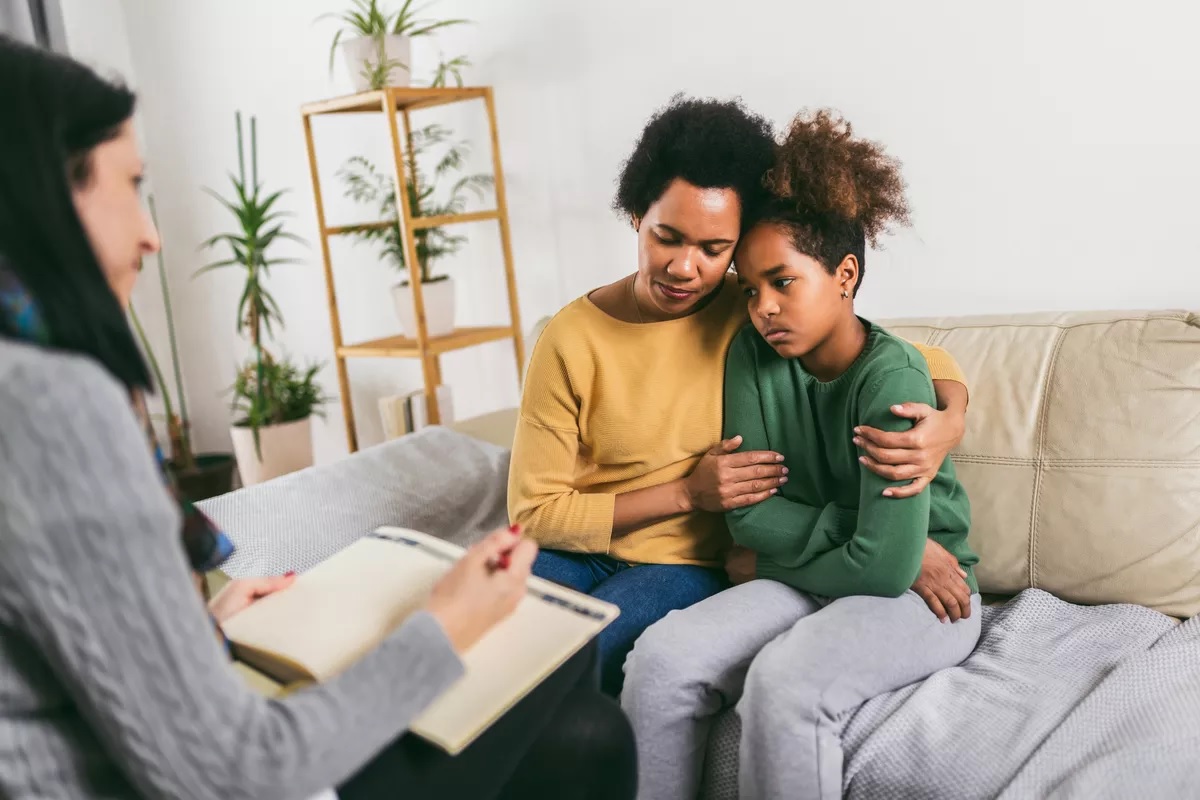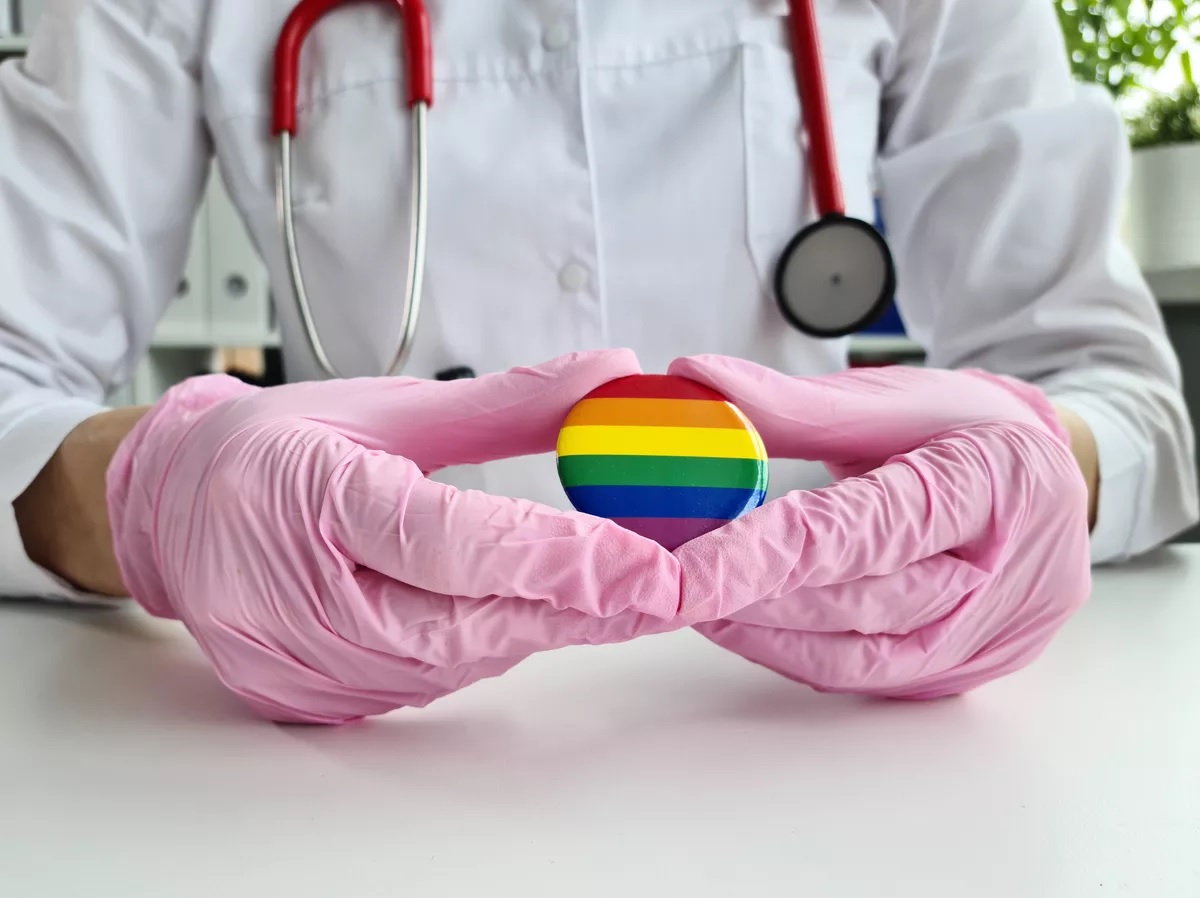- Call or text 988 to use the Suicide and Crisis Lifeline or visit 988lifeline.org for online chat service.
- For LGBTQ+ youth and adults, call the LGBT National Hotline at 888-843-4564 or email help@LGBThotline.org.
1. LGBTQ+ youth face mental health barriers

LGBTQ+ youth deal with worse mental health than other young people. The Trevor Project’s 2022 National Survey on LGBTQ Youth Mental Health highlights worrying trends:
- LGBTQ+ high schoolers are 4 times more likely to have attempted suicide than heterosexual high school students
- 73% of LGBTQ+ youth reported experiencing symptoms of anxiety
- 58% reported experiencing symptoms of depression
- 45% reported seriously considering suicide in the past year
- 14% attempted suicide in the past year
The situation is even more dire for US LGBTQ+ youth of color. The National LGBT Health Education Center discussed the combined impact of racism and LGBTQ+ discrimination on Black LGBTQ+ people, explaining, “As racially marginalized people, they already face biased policies and systems as they try to gain access to housing, jobs, places of leisure, and health care. As LGBTQ people, they may have an even greater likelihood of receiving unfair treatment linked to their sexual, gender, and racial identities.” This dual discrimination contributes to poor mental and overall health.
LGBTQ+ youth often have overlapping challenges, including race and economic status, which hinder access to quality care.
- Bullying and violence: nearly 70% reported experiencing discrimination and more than 33% reported being physically threatened or harmed.
- Rejection from loved ones: Fewer than 37% identified their home as an LGBTQ-affirming space and 17% reported being threatened with or subjected to conversion therapy.
- Homelessness: LGBTQ+ youth face more than twice the risk of homelessness, especially Black and Indigenous youth.
Why it matters: Providing inclusive and affirmative health and social services helps improve mental health. Some behavioral health professionals specialize in LGBTQ+ care — but 60% of LGBTQ+ youth who tried to obtain mental healthcare over the past year were unable to get it.
- 27 states and 4 US territories don’t have laws or policies protecting LGBTQ+ patients from being denied healthcare coverage.
- 15 states lack Medicaid policies regarding LGBTQ+ healthcare and coverage.
- 1 in 8 LGBTQ+ patients live in states where doctors can legally refuse to treat them.
LGBTQ+ advocacy is needed in all spaces – including support from parents and caregivers – to effectively end conversion therapy, laws preventing gender-affirmation treatments, restricted hospital visitation rights, suppression of affirming media presentations and education, and other harmful practices and policies. 🏳️🌈
2. Providing inclusive care

Many LGBTQ+ people delay or forgo care due to fear of discrimination. LGBTQ+ people are already at-risk for substance use disorders, mental health illnesses, and eating disorders. Examples of discrimination include:
- Being refused care due to actual or perceived sexual orientation.
- Healthcare providers using harsh or abusive language.
- Transgender patients being refused care due to their actual or perceived gender identity.
Leading the way in New Jersey: RWJBarnabas Health, a trailblazer in LGBTQ+ health, received a 2022 Leader in LGBTQ Healthcare designation from the Human Rights Campaign for 10 of its hospitals. In 2017, RWJBarnabas opened the Babs Siperstein PROUD Center at Robert Wood Johnson University Hospital Somerset, the first New Jersey hospital to offer specialized LGBTQ+ primary care. In addition to hormone therapy, support groups, and other services, the hospital system provides LGBTQ+ Health Navigators who help patients find resources to meet their needs.
Filling the gap in rural Iowa: After their son came out as transgender, Dr. Kyle Christiason and his wife didn’t know how to support the child’s specialized health needs. After a yearlong search, they found a provider 3.5 hours away. Hoping to save others the struggles his family faced, Dr. Christiason led the launch of UnityPoint Health Prairie Parkway LGBTQ Clinic. Twice a month, the clinic provides such care for its rural patients as STI prevention, testing, and treatment; pre-exposure prophylaxis (PrEP); and gender-affirming voice therapy. The clinic was designated a LGBTQ Healthcare Equality Top Performer by the Human Rights Campaign Foundation in 2018 and served over 150 patients in its first year.
3. Tackling the youth mental health crisis
In the face of mounting mental health issues, organizations across the country are mobilizing to promote young people’s mental wellbeing. We profile 3 groups below.
Building student resiliency: The Jed Foundation partners with high schools and colleges to promote emotional health and prevent suicide. Through its JED High School program, the Foundation helps schools build a positive climate, recognize and respond to students at risk, and connect students to mental health resources. JED also provides resources for young people to promote social connectedness, encourage them to seek help, and bolster their emotional health. And, the Healing Centered Engagement initiative in New Jersey offers training and coaching for a whole school — teachers, bus drivers, janitors, and other staff — on how to support young people’s mental wellbeing. Since launching in 2021, the program has served 60 New Jersey schools and trained more than 3,500 school staff and community members.
✅Lesson learned:
- Promote school-based support: Schools are uniquely positioned to identify mental health concerns and support students early on. But they often lack the resources, leaving school staff and administration overwhelmed. Such programs as JED High School provides personalized guidance on how to support students.
Supporting mental health of the Black community: The Loveland Foundation Therapy Fund supports the mental wellbeing of Black women, girls, and gender nonbinary people through continuing education workshops and resources for therapists, group support sessions, and financial assistance.
✅Lesson learned:
- Increase access to care – Mental healthcare is expensive. In the US, the average therapy session fee ranges from $135 in Idaho to $213 in New York. And many therapists don’t accept insurance. The Loveland Therapy Fund addresses this problem by paying for up to 12 therapy sessions. The Foundation also partners with the National Queer and Trans Therapists of Color Network, Black Female Therapists, Therapy for Black Girls, and other organizations to provide high-quality, culturally-competent care. In 2021, Loveland Therapy Fund served over 5,000 people and paid for over 51,900 hours of therapy.
Speaking through music: The Sound It Out campaign helps parents and caregivers speak with middle schoolers about emotional wellbeing through music and interviews from artists including KAMAUU and Empress Of. The campaign gives caregivers guides on how to have conversations on mental health with children.
✅Lesson learned:
- Support caregivers – Children’s mental health is strongly connected to that of their caregivers, and vice versa. Parents and caregivers can help model healthy coping skills and promote development. But many caregivers of young children lack resources and support to help their kids and themselves. Sound It Out encourages open communication with children and shares resources to do so.
4. The roundup
Learn about upcoming events, new funding opportunities, and jobs in maternal and infant health and early childhood:
- Funders advancing LGBTQ+ health: Join Grantmakers in Health November 16-18 for its Fall 2022 Forum in Washington, DC. Register by November 10 to discuss legislation harming the LGBTQ+ community and actionable strategies to promote health for all.
- Addressing LGBTQ+ youth homelessness: Joe Barb and husband Lambert Miller are filling the LGBTQ+ youth resource gap in their home state of South Dakota. The couple founded The Circle, a youth drop-in and transitional housing center connecting youth to community resources, education opportunities, and healthcare services. Read more about Joe’s advocacy.
- Destigmatizing mental health: Actress and singer Selena Gomez hosted the first-ever Mental Health Youth Forum at the White House and launched Wondermind, a media platform that shares mental health resources and fights mental illness stigma. An upcoming documentary film, My Mind and Me, details how she manages depression, anxiety, and bipolar disorder while maintaining her career.
